#hermetic library
Text
Witchy Library!
PSA to any of my occult darlings! Here's an e-library archive I found while cleaning out my likes
Subjects range from hermeticism and alchemy, to yoga, mythology, hypnosis, witchcraft, enochian magick and more. Go nuts 🔮
#witchy things#witch#occult#books#witchcraft#witchcraft books#occult books#elibrary#witchcraft resources#witchblr#alchemy#witchy books#mythology#hermetic library#hermeticism
211 notes
·
View notes
Text
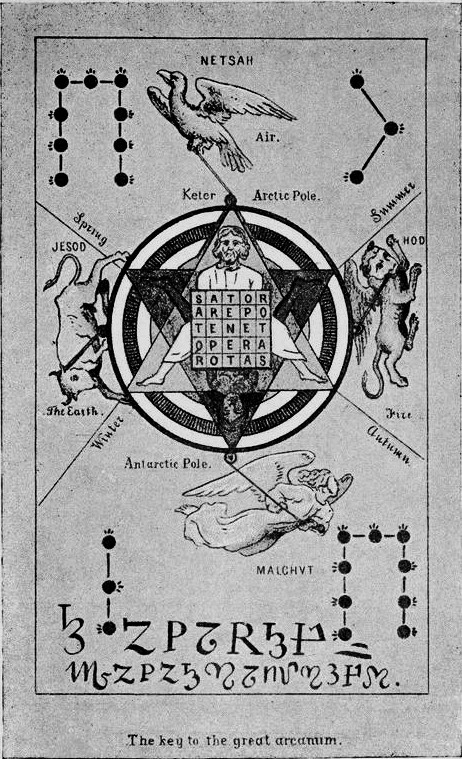
Key of the Tarot: there are four suits, wands, caps, swords, coins or pentacles, corresponding to the four cardinal points of Heaven, and the four living creatures or symbolic signs and numbers and letters formed in a circle; then the seven planetary signs, with the indication of their repetition signified by the three colours, to symbolize the natural world, the human world and the divine world, whose hieroglyphic emblems compose the twenty-one trumps of our Tarot. In the centre of the ring may be perceived the double triangle forming the Star or Seal of Solomon. It is the religious and metaphysical triad analogous to the natural triad of universal generation in the equilibrated substance. Around the triangle is the cross which divides the circle into four equal parts, and thus the symbols of religion are united to the signs of geometry; faith completes science, and science acknowledge faith. By the aid of this key one can understand the universal symbolism of the ancient world, and note its striking analogies with our dogmas. One will thus recognize that the divine revelation is permanent in nature and humanity.
#key of the tarot#bibliophile#literature#quotes#upload#occult#occult art#occultism#great arcanum#symbols#hermetica#hermetic alchemy#hermetic library#hermetismo#hermetic tarot#tarot#geometry
143 notes
·
View notes
Text

Ateneo Grand Splendid, CABA, Argentina. 35mm
#argentina#photografy#cotidiano#no filter#not filtered#travel#ligth#trip#photooftheday#phone#ateneo#buenos aires#tourism#hermetic library#teatre#iconic#grand splendid#35mm film#kodak color film#olympuscamera#olympus stylus#camara analogica#analog#french architecture#library#history#arquitecturephotography
66 notes
·
View notes
Text
Poimandres Dialogue & PGM XVIIb. 1-23
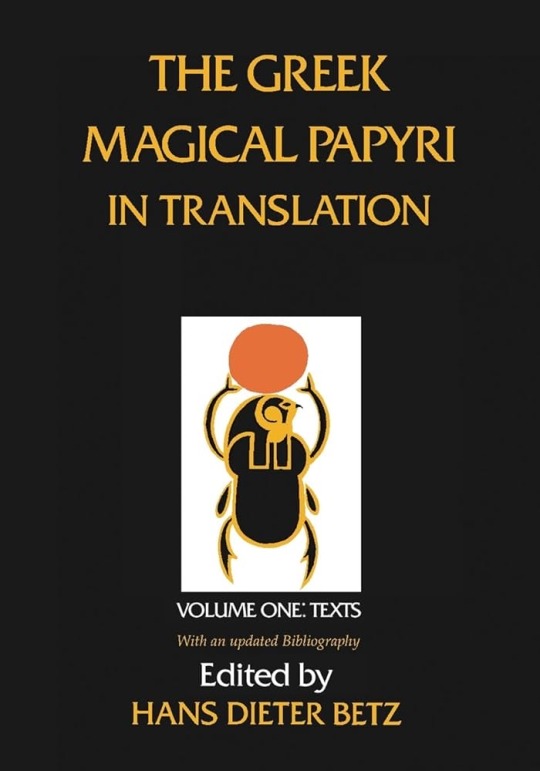
Interesting parallel here, as Hermes Trismégistōs is being taught by Poimandres the elements and the “unreasoning” creatures that spring forth from said elements and in PGM XVIIb which appears to be a simple theurgic hymn to Hermes. In line 15 it states: “You lord it o’er the Elements: fire, air, water and earth.”
Here is the whole hymn as follows:
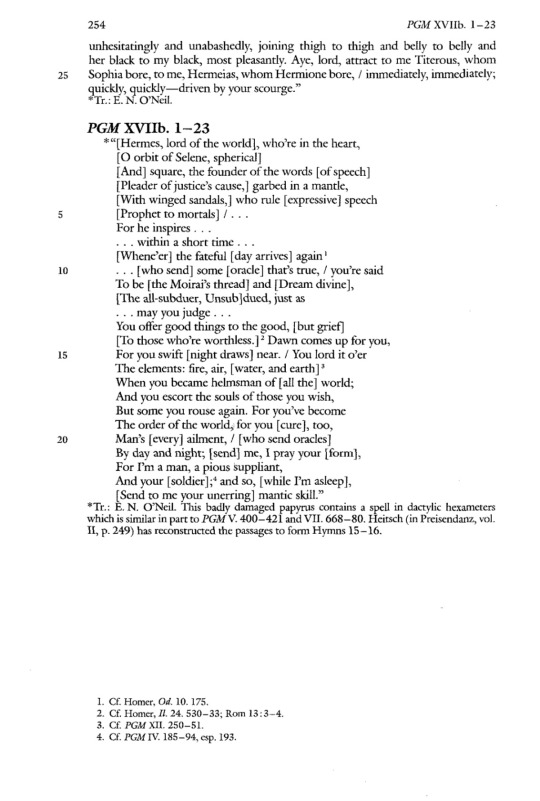
This hymn just seems very similar to CH I. 5 and 11. In paragraph 5 of the Corpus Hermeticum, Hermes Trismégistōs learns of “The fire that was nimble and piercing and active as well…” and the rest of elements that are “stirred to hear by the spiritual word (Logos) that moved upon them.” And in paragraph 11 he learns of the elements air, earth and water and the unreasoning creatures that spring forth from said elements.
What’s interesting is my equation of Hermes as the spiritual word. The divine Logos. Is this Hermes Trismégistōs being taught by Poimandres the nature of Hermes, the Olympian, as Logos and his role in Hermetic creation? Seems like an argument could be made for this. What’s tricky though is who Hermes Trismégistōs is. Cause at times, to me at least, He is Hermes the Olympian and Thoth syncretized, other times he is a divine prophet, but a man no less.
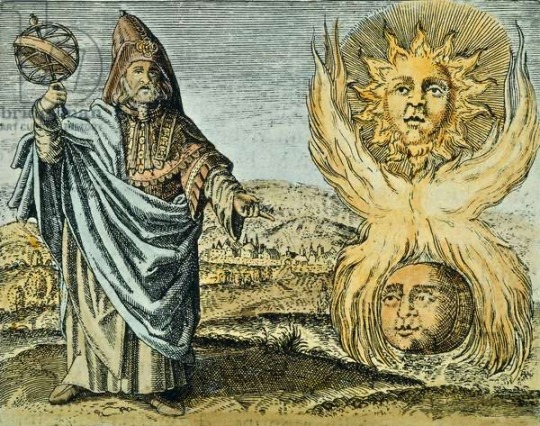
Thoth is also equated in my head canon as the divine Logos, but the name of which god is the Logos of the Poimandres dialogue is not what is important I think. For in both mythologies: Hermes the Olympian is a brandisher of speech, gifting said speech to we mortals and to Pandora, and Thoth is the creator of the hieroglyphs, recorder of all names who enter the Du’at. So, they can both be the Logos, as described in the Poimandres dialogue, i.e. CH I.
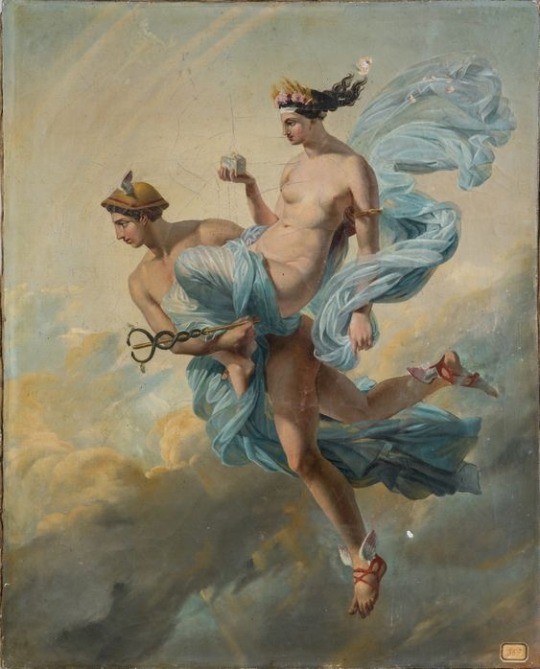
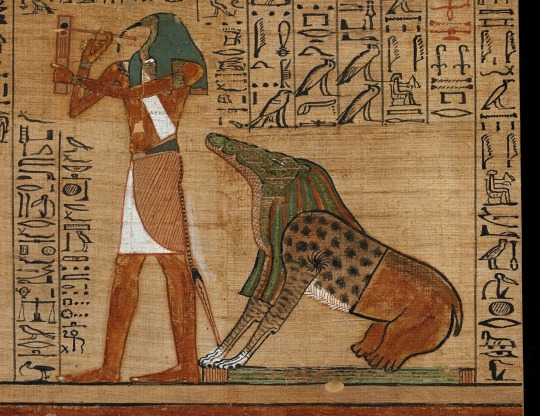
Not really sure where this is going, other than just making an interesting parallel to Hermetic “philosophy” and more practical Hermetic “magic/theurgy”. Anyways —Khaire Hermes!
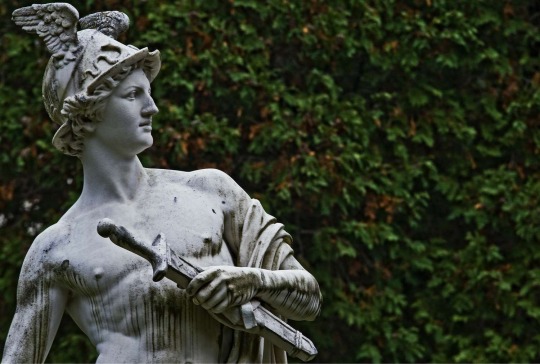
#hermetic library#hermeticism#philosophy#hermes trismegistus#hermetica#occult#greek magical papyri#hermetic philosophy#hermes#thoth#duat#therugy
13 notes
·
View notes
Text
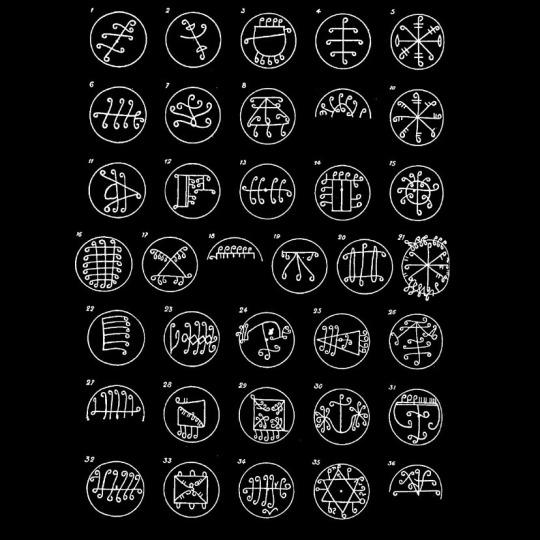
Sigils of the 36 Decans from the Catalogus Codicum Astrologorum Graecorum, a compilation of translations of Greco-Egyptian magical texts on the Decans and their uses.
The names of the Decans as given in the catalogue:
𓇼PARKHÁM
𓇼OUALÁKH
𓇼DELPHAÁ
𓇼ZAKKHÁL
𓇼KHOUNTHÁ
𓇼ANESIOÚM
𓇼PARESKHÁRTI
𓇼HIERASESÊR
𓇼ANASÁM-TETÊKH
𓇼SARKHAÁM-KOMPHES
𓇼TENOÚM-TANLÁKH
𓇼TROUKHÁP-IÁLEM, SAMPÁKH
𓇼APHÁKH-MPEÍTH, PANKHATÁP
𓇼TALANTÍS-KHARKHÁM
𓇼DEROPOÚT
𓇼MENAÍM-KHILLÁ
𓇼MPEÍ-PHOLÁKH
𓇼MARKHEM
𓇼ZÁKH-MEM
𓇼SEPTETÚL
𓇼SELOUÁKHAM
𓇼AMPÁNAN TZÉNGGIKH
𓇼LÁPH-MEÍKH
𓇼ARKHÍMOI-IELOÚPH
𓇼ANASÁM-TERIKHEM
𓇼MAKHRÁM
𓇼KHALKHÊM-IKHÉM
[Capricorn is missing]
𓇼BAZEÍNKH
𓇼KHOUNLIÁKHM
𓇼MAKHILOÚKH
𓇼KAÍN-KHÁM
𓇼POKH-MELLEPH
𓇼SUREM-OLÁKHM
#hermetismo#hermeticism#hermetic philosophy#hermetic library#hermetica#Egyptian decans#decans#decan spirits#star spirits#astrology#astrological magic#hellenistic astrology#ancient astrology#astrology witch#astrologycommunity#traditonal astrology#magicien#amulets#talismans#talismanic#sigil witch#sigil magic#sigil making#sigilcore#sigilwork#sigils#sigilyph#sigil creator#egyptian astrology
51 notes
·
View notes
Text
The Emerald Tablet
True it is, without falsehood, certain and most true.
That which is above is like to that which is below, and that which is below is like to that which is above,
to accomplish the miracles of one thing.
And as all things were by contemplation of one, so all things arose from this one thing by a single act of adaptation.
The father thereof is the Sun, the mother the Moon.
The wind carried it in its womb, the earth is the nurse thereof.
It is the father of all works of wonder throughout the whole world.
The power thereof is perfect.
If it be cast on to earth, it will separate the element of earth from that of fire, the subtle from the gross.
With great sagacity it doth ascend gently from earth to heaven. Again it doth descend to earth,
and uniteth in itself the force from things superior and things inferior.
Thus thou wilt possess the glory of the brightness of the whole world, and all obscurity will fly far from thee.
This thing is the strong fortitude of all strength,
for it overcometh every subtle thing and doth penetrate every solid substance.
Thus was this world created.
Hence will there be marvellous adaptations achieved, of which the manner is this.
For this reason I am called Hermes Trismegistus, because I hold three parts of the wisdom of the whole world.
That which I had to say about the operation of Sol is completed.
#alchemy#emerald tablet#the emerald tablet#Hermes Trismegistus#hermes#hermetic library#hermetic philosophy#hermetic#hermeticism#occult
33 notes
·
View notes
Text
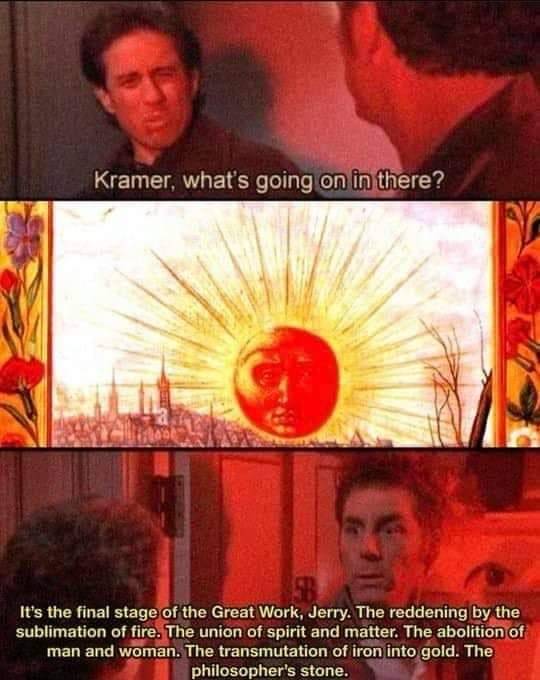
10 notes
·
View notes
Text
The Kybalion by The Three Initiates
The Kybalion
A STUDY OF
THE HERMETIC PHILOSOPHY OF
ANCIENT EGYPT AND
GREECE
BY
THREE INITIATES
“THE LIPS OF WISDOM ARE CLOSED, EXCEPT TO THE
EARS OF UNDERSTANDING”
TO HERMES TRISMEGISTUS
KNOWN BY THE ANCIENT EGYPTIANS AS
“THE GREAT GREAT”
AND “MASTER OF MASTERS”
THIS LITTLE VOLUME OF HERMETIC TEACHINGS IS REVERENTLY DEDICATED
Published Anonymously 1908
Second edition, compiled by…

View On WordPress
#circumstances don&039;t matter#Divine Feminine#hermetic library#hermeticism#kybalion#law of assumption#law of balance#law of gender#MANIFESTING#rising above circumstances
0 notes
Text
Lock me into a library or leave me alone
1 note
·
View note
Text
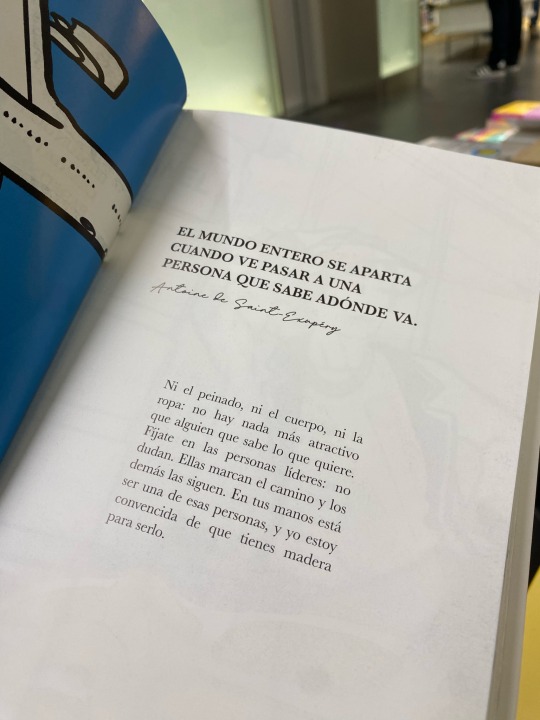
1 note
·
View note
Text
https://t.co/xn8HKmq1hjhttps://youtu.be/rU0qVfI6ursFirst Gnostic Church of Cosmic LightWhat is good?—Whatever augments the feeling of power, the will to power, power itself, in man.What is evil?—Whatever springs from weakness. What is happiness?—The feeling that power increases—that resistance is overcome.Not contentment, but more power; not peace at any price, but war; not virtue, but efficiency (virtue in the Renaissance sense, virtu, virtue free of moral acid).- Nietzsche
#Nietzsche#Nietzschean#gnosticism#hermetic principles#hermetic philosophy#hermetic library#esoteric christianity#esoteric knowledge
1 note
·
View note
Text
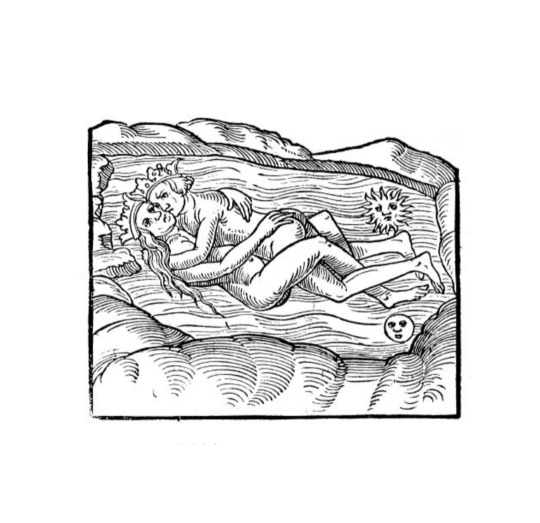
Chemical Wedding : in alchemy, the joining (coniunctio) of the male
elements fire and air (represented by sulphur) and the female elements
water and earth (represented by argent vive or quicksilver) in
philosophical – mercury – symbolized by gold (King Sol) and silver
(Queen Luna) respectively – in the final phase of the magical opus. This is
the fusion of opposites which produces the Philosopher’s Stone.
#chemical wedding#alchemy#hermetic alchemy#hermetismo#hermetic library#hermetica#conjuction#bibliophile#literature#upload#coniunctio#alchemical#quotes
106 notes
·
View notes
Photo

Hermetica: The Ancient Greek and Latin Writings which contain Religious or Philosophic Teachings ascribed to Hermes Trismegistus
#hermetica#corpus hermeticum#hermeticism#hermetic philosophy#egyptian philosophy#greek philosophy#hermes#hermes trismegistus#mercurius#thoth#ascelipius#hellenistic#late antiquity#library of alexandria#greco-roman egypt#emerald tablet#gnosis#gnosticism
182 notes
·
View notes
Text
Iamblichus’s De Anima & Philosophical Hermetic Influence?
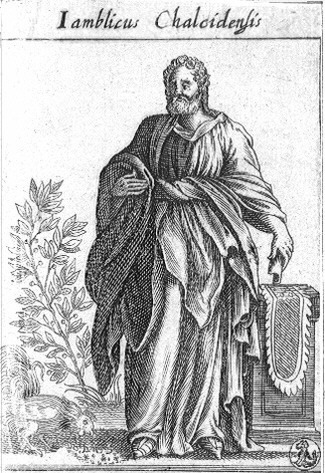
Chapter 1. "Nature of The Soul”
I will be taking sentences and sections from chapter 1 and compare/expand on them to that of the Stobean, Corpus Hermetica, & the Definitions to Asclepius from Hermēs. (David Litwa’s ‘Hermetica 2’ & Brian Copenhaver’s ‘Hermetica.’ Jean-Pierre Mahé Definitions to Asclepius… [SH-CH-DH]).
Chapter 1–paragraph 1:
"I see in these categories much that is ambiguous and confused (for motions in the category of change are not be considered as identical with motions in the category of life, nor kinds of knowledge that involve imagination with those that transcend it, nor the sort of purity of essence proper to air with that of things essentially incorporeal), and much that is incomplete and inadequate (for it not possible to take in all the varieties of opinion under these three categories.)
Here we see Iamblichus refuting Aristotles ‘Physics’— namely, his idea of the tripartite soul:
Motion
Knowledge
Subtly of Essence (Incorporeal Substance)
To divide the soul into strictly three parts is too simple—given the nature of the soul, according to Iamblichus.
(Should be noted Iamblichus is known for over-generalizing his predecessors for the sake of argument, and he admits this a few times in his writings.)
I’m inclined to agree with Iamblichus, given The numerous references in philosophical Hermetica I have found to support this. Interestingly enough, SH 3 gives a Platonic tripartite function.
SH 3:4 tells that the "soul is ever moving and is always moves itself and energizes the motion in other beings." In verse 5 it gives three kinds of souls:
Divine
Human
Non-Rational
Though the last verse. SH 3:9, encourages us to look at the “4th type of soul” this is the Soul that is “to be the moving agent of inanimate beings. To me this seems like it could fall under Aristotles “Subtly of Essence” category, but until I investigate Aristotle myself, and inclined to agree with Iamblichus in the mean time.
Looking at CH XII [21]… “Soul” is indeed one of God’s limbs: "like wise the <limbs of God> are life, immortality, {fate}, necessity, Providence, Nature, SOUL & mind…"
So to me, again, I agree with Iamblichus on the ambiguity of the tripartite of the soul. (Until, I of course, study Aristotles and Plato’s tripartite soul more in depth, I see nothing wrong with agreeing with Iamblichus, until I find more time to study the nuances of all this.)
Paragraph 2
"Some trace back the essence of the soul to the first principles of the four elements. For the primal atomic bodies are more elemental even than the four elements; being unmixed and completely filled with pure primal essence, they do not receive in themselves any trace of division. These primal bodies possess an infinite number of forms, one among which is the spherical, and it is out of spherical atoms that, they say, the soul is constituted."
Here, Iamblichus is refuting the Atomist of his day, Democritus & Leucippus. I believe Iamblichus is saying here that souls have infinite possibilities of taking whatever form Nature has constructed.
Turning back to SH 3:4– the soul moves itself, and energizes all beings. Namely, the 4 elements alone, cannot energize all things. That is what Soul does. So, in Soul’s infinite number of forms, receives not division because it is indeed constituted, or causes by the All ( God).
Now looking CH II [12]
"God is not mind, but the cause of mind’s being; He is not Spirit, but the cause of spirit’s being…"
So God is the cause of Soul’s being, but He isn’t Soul. (that is another discussion!) in CH X, God’s activity is to Will All things into being. Thus, this makes me agree with Iamblichus. As far as the spherical atoms that make up the Soul—I looked to CH XII [1] to understand that and to me it makes sense. If gods are immortal humans and humans, mortal gods; so The spherical nature of “what constitutes the souls”, as Iamblichus purposes, is at least to me, Hermetically sound.
Now looking at DH 1:3
"Just as soul keeps up the figure (while being) within the body, which cannot possibly be constituted without a soul, likewise all of that is visible cannot possibly be constituted with out the invisible.”
This kind of rings back to SH 3:9 — that “4th kind of soul that moves inanimate objects. While I believe in DH 1:3 “the invisible” here could be referring to God, but I think, “the invisible” could mean Soul, when looking at the verse under a different context, in purpose of supporting Iamblichus’s Hermetic influence (could be a stretch but I included this anyways).
Paragraph 3
"Closely allied to this opinion there is a view, not handed down by tradition but plausibly derived from it, which makes the soul combination of all the qualities and the simple summation of them, whether arising as a result of them or existing prior to them."
Not it’s a little unclear to me if Iamblichus is viewing Soul’s as associated with bodies, or if he views them as an incorporeal quality. Referring to the Stobaean Hermetica chapters 16 and 20 seem to support Iamblichus—IF he’s concluding that Soul’ are bodiless(incorporeal). Which he does in the next paragraph.
SH 16 states:
"Verse 1: the soul is a bodiless reality. Though it is in a body, it does not loose it’s essential principle."
SH 20 reiterates this.
Paragraph 5
"…while many of the Platonists and Pythagoreans adjudge it to be the attunement which is interwoven with the cosmos and inseparable from the heaven."
Now this paragraph is speaking on the “Attunement of the Soul.” This attunement is not inherent in bodies. Iamblichus calls it a “mathematical attunement.”
This corresponds very well with SH 19 in my opinion.
"Now the Soul is an eternal intelligent reality, employing intelligence as its own rational faculty. Contemplating its own thought, it becomes cognizant of harmony.
In verse 3: "now there are two kinds of life and motion in the soul: one is in accordance with intellectual reality, the other being in accordance with the natural body."
These two verse from the Stoabean Hermetica perfectly support the Soul’s “mathematical attunement” along with this attunement being interwoven with the Cosmos(natural body SH19:3) & inseparable from the heavens (intellectual reality SH 19:3)
Paragraph 7
"…separates the Soul off, inasmuch as it has come about as following upon Intellect, representing a distinct level of being, and that aspect of it which is endowed with intellect is explained as being connected with the intellect certainly, but also subsisting independently on its own, …"
Here I cited SH 19:3 again. Along with SH 3:6-7–
SH 3:6-7 — "When the soul of mortal animals separates form it’s non rational parts, it does off and into the divine body, which is ever moving and moved in itself. The human soul has a portion of the divine. Yet non-rational elements, namely drive and desire, are attached to it."
Paragraph 8.
"Orpheus himself considered that the soul was separate and one and that out of it there springs many divisions, and that many intermediary “breaths” descended to the individual souls from the universal soul."
This immediately led me to think of Corpus Hermeticum X [7] & from the Stobaean Hermetica 23:14. Here we see that God(the universal Soul) indeed does dispense all the souls in the universe. In SH 23:14–we see that God fashions the souls from “a good amount of his breath, and by an act of intellect mixed it with fire.”
CH X [7]— "In the General Discourses did you not hear that all souls whirled about in all the cosmos—portioned out, as it were — come from the One Soul of All?"
SH 23:14

Chapter 2. The Power of souls.
Paragraph 10.
"According to those who think that the soul lives a double life, in itself and one in conjunction with the body, they are present in the soul in one way but in the common anime in another, as Plato and Pythagoras think."
Now Iamblichus isn’t always clear on who he sides with when presenting these theories from other philosophers. But this sentence/theory rings the most “Hermetic” to me. Let’s see if there’s any Hermetic literature that can support this “double life” of the soul:
We will be looking at a few chapters in the Stobaean Hermetica(SH) specifically 2B, 3 & 19.
SH 2B:6-7

So early on we are presented with a two fold nature of the Soul within this “battle” that must take place within the Soul.
More specific examples here:
SH 3:1-4

Here we are presented with in verse 4 that the soul is ever-moving and energized the motion in other beings. In verse one it makes it explicitly clear of the souls two fold nature:
Immortality
always moving.
SH 19 should help solidify our beliefs that the souls “double life” is a sound hermetic theory that I myself would be comfortable following. We could go into more Hermetica to explain *why* the Soul is immortal—another day perhaps?
SH 19: 1-4

Here, we clearly are told of the two kinds of life and motion within the soul: one in accordance with intellectual reality and one in accordance with the natural body. That “double life” of the soul that is “in itself” and “one in conjunction with the body” as described by Iamblichus should very clear now.
See verse 1 for how the Soul is also “in itself” —this rings back to the “Battle within the Soul” verses in SH 2B. The Soul employs or assigns intelligence. When we shed our physical body (desires and passions). To me, this is how the soul is also “in itself” while also being in “conjunction with the body.”
May come back to expand on that if I can…
Paragraph 11.
(To be continued…)
#iamblichus#occult#hermeticism#philosophy#plato#neoplatonism#hermes trismegistus#hermetic library#hermetic philosophy
12 notes
·
View notes
Text

The Vegetarian Prayer of Thanksgiving from the Nag Hammadi Library (Coptic Gnostic Scriptures):
gnostic #hermetic #gnosis #spirituality #gnosticgospels #vegan #vegetarian
The Gnostics Were Vegetarians: The vegetarian Prayer of Thanksgiving is part of the Hermetic scriptures of Egypt and is also part of the Nag Hammadi Library, the Gnostic Gospels. At the end of the prayer the final verse reads: “When they had said these things in the prayer, they embraced each other and they went to eat their holy food, which has no blood in it.”*
“Vegetarian food” — footnote from the Marvin Meyer’s translation of this in, “The Nag Hammadi Scriptures”.
A vegetarian meal. This passage is also found in the Epilogue of Asclepius, in “HERMETICA,” translated by Sir Walter Scott: “Having prayed thus, let us betake ourselves to a meal unpolluted by flesh [animalia] of living things.”
The G.R.S. Mead translation of the same passage: “With this desire we now betake us to our pure and fleshless meal.”
#vegan#vegetarian#christianity#gnostic#nag hammadi library#hermetic#christian mysticism#gnostic gospels
10 notes
·
View notes
Text

Oliver with his darling books. One day, he'll tell you all about them if you're not careful.
8 notes
·
View notes